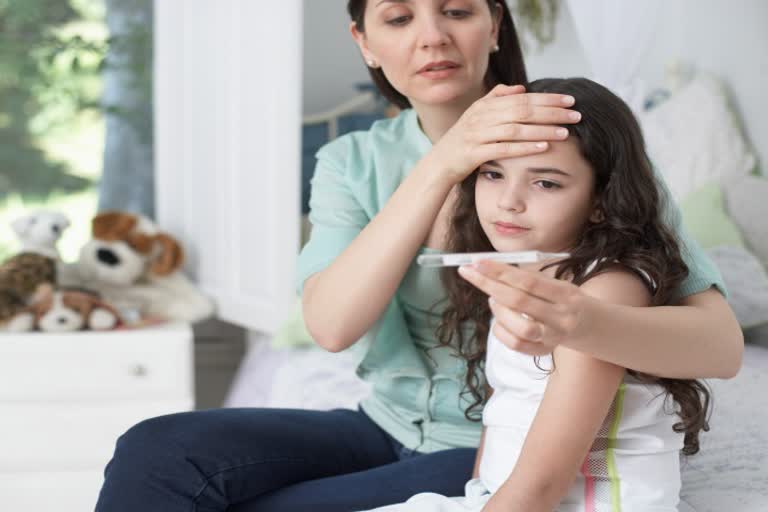Fever is defined as an increase in the body’s core temperature and not the external temperature. The normal temperature of the body is between 97.5-99.5 °F or 36.5 to 37.5-°C. Parents usually complain that the body feels warm but this can be due to the external surrounding temperature and can vary due to the warmth/ coldness of the hand feeling the body of the child. Hence it is a must that we check the temperature with a thermometer. If the child feels warm but is moving around freely, active, feeding well, and if the thermometer reads the normal temperature, then no need to worry.
Dr. Vijayanand Jamalpuri, MD, MRCPCH, FRCPCH, CCT in Paediatrics (UK) & Fellowship in Neonatology (NZ), Consultant Neonatologist and Paediatrician at Rainbow Children’s Hospital, Hyderabad, explains to us why is it important to understand the cause of a Child's fever.
- Simple viral infection like cold
- Urine infection
- Throat infection
- Ear infection
Some of the causes for fever can be serious infections like flu, dengue fever, COVID-19 during the pandemic, Malaria – high fever not responding to usual medications. Based on what other symptoms are present, we can look for a potential cause. The majority of the fevers are simple viruses.
Flu is a viral infection caused by an influenza virus that can make children very sick. Symptoms are more severe than the common cold. Very high-grade fever, severe body aches, they may not be able to eat. There is a vaccine available for flu and it is highly recommended for children, elders, and also for pregnant women because flu can cause various complications including pneumonia.
Worrying signs parents to look for in a child with fever:
1.Fever is very high 102 °F or 103
2.The baby is becoming very drowsy, sleeping all the time.
3. Not accepting feeds or not showing interest in feeds
4.Having breathing difficulty
5. Abnormal movements suggestive of fits
6. Fever with any kind of severe rash
Fever with rashes or eruptive fevers:
Many viral infections cause a rash, what we call viral exanthema e.g.
- Measles, but with extensive use of the measles vaccine, the incidence has come down. That is why the measles vaccine at 9 months is very important for a child.
- Chickenpox- Kids get a bubbly rash and are generally well but sometimes can become seriously sick. The vaccine is available for chickenpox and it is recommended.
- Hand foot mouth disease a condition where the kids get ulcers in the mouth, a bubbly rash over hands and feet. Due to these painful mouth lesions, the child may refuse feeds
- Dengue fever can also present with a rash.
Between 6 months to 5 years, some kids get fits with fever and they are called febrile fits. In cases where the fever does not settle with medication, cold sponging helps. These kids generally do not get further episodes of fits in later life. They do not need to be on any long-term fits medication. Any child who develops fits along with fever should be seen by the pediatrician.
Also Read: COVID-19 Second Wave: Post-Recovery Effects And Preventive Measures For Kids
Normally during fever, the appetite goes down, and then there is slight weight loss which is a matter of concern for the parents. If the child is not eating it is okay, as long as the child is taking plenty of fluids, like sago rice water, daal paani, rice water or kanji, WHO approved ORS, etc. It is important that the child is given soft, easily digestible, food like soft khichdi, porridge. It is very important to provide nutritious food to the child once the child’s appetite improves after the fever. It helps the child to catch up with growth. This is very important to prevent the child from becoming malnourished.
When to visit the doctor?
-Fever with usual cold and cough settles in 2 to 3 days. Parents should take the child for a checkup if the fever lasts more than 2 days duration, the child is sleeping most of the time, fever which does not respond to the fever medications or any of the warning signs as described above. Each baby needs to be addressed on a case-to-case basis. Any infant under 3 months of age with a definite fever should be seen by a doctor.
Fever is not always due to infection but can also be due to such as rheumatological causes, heat stroke (continued exposure to the heat of the sun in summer).
Fever due to vaccination:
Fever due to vaccination is common and has to be managed with fever medications as given by the doctor. It is not mandatory that every child has to get a fever after vaccination as the body response is variable. However, fever occurring after 48 hours of a vaccine is generally not due to a vaccine and has to be investigated thoroughly for determining the cause.



